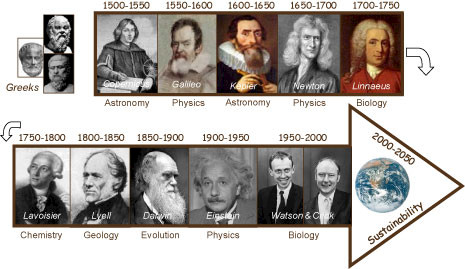Bill Dennison speech to Latornell conference, Ontario, Canada: Part 3 - History of Science Communication
Bill Dennison ·PART 3; History of Science Communication
There is a history of effective science communication that actually changed the world. If we think about the Copernican Revolution, Copernicus was a Polish astronomer, who published a book in 1543 on the movement of the Earth around the Sun, not the Sun around the Earth, which was the established belief at the time. And we call this the "Copernican Revolution". Nobody died, it wasn't a violent revolution, but it was a revolution in the way people thought. So everybody on Earth suddenly, actually not everybody, because the Catholic Church was a little resistant. Copernicus' successor Galileo ended up in house arrest, because he didn't go along with that Church vision. But nonetheless, eventually we all kind of figured that one out. So every fifty years, there are these revolutions in the way we think and in the way that society thinks. These revolutions are fostered by great communicators. And you can look at Newton and the Laws of Thermodynamics—for every action there's an opposite and equal reaction. Those basic things that are fundamental. Lavousier for Chemistry, Lyle for Geology, and Charles Darwin—Darwin's books were best sellers. And of course the Theory of Natural Selection that Darwin promoted was an amazing transformation in the history of human thought. Who has heard of Alfred Wallace? Okay, just a few. Who's heard of Charles Darwin? All right, everyone. Well guess what? These guys published papers back-to-back in "Nature" on the theory of natural selection. They came up with this independently. Wallace was in the Indonesian archipelago as a Field Biologist, chasing butterflies and beetles and things. He came up with a Theory of Natural Selection and submitted it to The Royal Society in London. Some buddies of Charles Darwin said, "Hey, this guy has the same idea that you've been talking about." So they published back-to-back. But who do we know now? We know Darwin, because he communicated this idea effectively. He was a very popular author, he wrote eloquently. So it was his communication skills that separated him from Wallace.

Einstein, the most famous equation in the world, e = mc2, and Watson and Crick with their discovery of the structure of DNA. Einstein led a revolution in physics and atomic energy, while Watson and Crick led a revolution in biotechnology and medical science. So these pioneers in science communication have done amazing things to transform the way we think on this planet. And they did it because society needed to know something. Society needed to know where we were in the universe, and where we came from. These are very fundamental, human knowledge needs. What do we need to know now? How can we live sustainably on Earth. That's the critical societal need. We are going to need somebody that comes out of a conservation authority, or comes out of a University or whatever walk of life to lead us to a paradigm shift about sustainability. So there is hope—we can have a paradigm shift, a sustainability paradigm shift, just like the paradigm shifts we've had historically.
This is the third post in a series about Bill Dennison's keynote address at the Latornell conference in Toronto, Ontario, Canada.
Other posts in this series:
1. Part 1 – Science Communication
2. Part 2 - Incorporating visual elements
4. Part 4 - Environmental Report Cards
5. Part 5 - Report card examples
6. Part 6 - Five step program for environmental report cards
7. Part 7 - Oh Canada!
8. Part 8 - Communicating Science Effectively poster
About the author
Bill Dennison

Dr. Bill Dennison is a Professor of Marine Science and Vice President for Science Application at the University of Maryland Center for Environmental Science.

